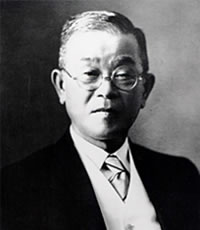建学の理念と教育の基本目標
建学の理念
建学の三理想
- 東西文化融合のわが民族理想を遂行し得べき人物
To produce individuals dedicated to our nation’s ideal of incorporating the cultural values of East and West - 世界に雄飛するにたえる人物
To produce individuals equal to the challenge of acting on the world stage - 自ら調べ自ら考える力ある人物
To produce individuals capable of independent thought and research
わが国初の私立七年制旧制高等学校がルーツ
「人間形成を根幹に、明日の新しい日本を担う、優れた人材を育てる」という理想を掲げた旧制武蔵高等学校は、その後の学制改革にともない、1949(昭和24)年に武蔵大学となりました。激しく揺れ動く現代の社会環境の中にあって、旧制高校創設時に掲げた「建学の三理想」は、本学の教育の原点となっています。
武蔵大学の教育の基本目標
策定経緯と大学の将来ビジョン
武蔵大学の初代学長を務めた宮本和吉は、最初の入学式(1949年)において「視野の広い、世界人としての日本人、自ら調べ自ら考え、批判的精神を失わない日本人を作り上げる」と述べ、旧制高校時代の建学の三理想(学園建学の精神)を受け継ぎつつ、ゼミナールを基礎とした少人数教育と外国語教育の充実を唱えました。
その後、世界と日本の情勢が大きく変化するなか、2006年度に策定された「武蔵学園将来構想計画」においては、三理想を原点としつつ、リベラルアーツを重視した教育のなかで「知と実践の融合」を図ることを大学のビジョンとしました。
その後、グローバル化がいっそう進む中、2014年3月の理事会においては、創立百周年に向けた武蔵学園の経営戦略として「まなざしを世界に向け、21世紀の課題を担う国際人 を育てる学校を目標とする」という「理事長ドクトリン」が採択されました。そして同年10月の理事会では、「〈世界に開かれたリベラルアーツの学園〉となることを目指す」と題した「学園長プラン」が定められました。これらを受けて武蔵大学は、第三次中期計画(2016~21年)において、2022年の学園創立100周年に向けて大学の目指す新しいビジョンを「異文化を理解し未来を創造する教養あるグローバル市民の育成~創立100周年に向け原点に立ち返り、学園建学の三理想の継承と未来への変革を目指す~」と定めました。
第三次中期計画では、このビジョンのもとに、戦略的事項として「リベラルアーツ教育を基盤とした〈グローバル市民〉の育成」を掲げ、グローバル化に向けた各学部の新しいプログラムやコースを着実に運営するとともに、リベラルアーツ教育の一層の拡充を図ることとしました。
同時に各学部・研究科の3ポリシーを見直し、「武蔵大学グローバル教育方針」を策定しました。
2021年3月の理事会において、既設学部の新しいグローバルコースを土台にした国際教養学部の設置(2022年4月開設)と四学部体制への移行を決定し、大きな変化をもたらしました。また、同理事会において、「世界の多様な人々と共に、人類の課題解決にリーダーシップを発揮する、知性と教養ある人物を育てる学校~これからの百年に向かって、武蔵学園の経営方針~」と題する新「理事長ドクトリン」及び「世界に開かれたリベラルアーツ&サイエンスの学園」を目指すことを謳う新「学園長プラン」が採択されました。これらをもとに2021年10月の理事会では、次の百年の歩みを見据えた第四次中期計画(2022~27年)が策定されました。これらを踏まえ武蔵大学のビジョンとして、また教育研究上の新しい目的として、「リベラルアーツ&サイエンス教育によって総合知・専門知・他者と協働する力・実践力をバランスよく身につけ、身近な場所での知的探究と実践にたゆまず取り組み、世界に雄飛して人的交流、組織的・地域的・地球的な課題の解決に貢献しうるグローバルリーダーの養成」を掲げることとしました。今やグローバル市民であることは日本社会で暮らしていても否応なく求められており、大学としてはいっそう能動的なビジョンを描く必要性を認識したからです。これにあわせて全学・学部・研究科の3ポリシー及びグローバル教育方針にも修正を加えました。
武蔵大学の「リベラルアーツ&サイエンス教育」
(武蔵大学の「リベラルアーツ&サイエンス教育」に関する学生向け説明です。)
武蔵大学のカリキュラムは、ディプロマ・ポリシーの冒頭に述べられている「リベラルアーツ」と「サイエンス」の学びを内容としています。リベラルアーツとは欧米の伝統的な大学教育で使われてきた言葉で、古代ギリシア・ローマにさかのぼる「自由七科」(セブン・リベラルアーツ)に由来します。古くは文法・修辞学・弁証法・算術・幾何・天文・音楽で構成されていました。時代によって科目は異なり、体育が含まれることもあります。現代の大学の教養科目(本学の総合科目)に近い面もありますが、哲学や自然学の専門的な書物を教材にする上級者向けの授業もあり、広く浅い初歩的な教育にとどまるものではありませんでした。なお「リベラル」とは「自由な」という意味ですが、それはリベラルアーツの科目群が「自由な市民」にふさわしい総合的な知識(総合知)と全人的な深い教養を培うことを目的としてきたからです。「アーツ」は広く「学芸」ないし「学術」を意味します(美術を意味する狭義のアートのことではありません)。「サイエンス」は「科学」のことで、体系的な理論や法則、実証や実験を重視する学問をさします。いわゆる理系の学問(自然科学)が代表例です。しかし経済学や社会学、数学や言語学などもサイエンスです。ただし、それらは内容的に「アーツ」とも重なりあっているので、「アーツ&サイエンス」「リベラルアーツ&サイエンス」という総称も用いられます。なお経済学や社会学、政治学などを全体として社会科学と呼ぶことがあります。一方、文学や歴史などの人文系の学問は人文学ないし人文科学と呼ばれます。また数学や統計学は数理科学と総称されます。「リベラルアーツ&サイエンス」は以上のような多様な学問の全体を包括する概念です。
武蔵大学のカリキュラムは、どの学部においても「総合科目」「外国語科目」「専門科目」からなっています。これらの三つのうち「総合科目」は全学共通です。「外国語科目」には全学対象のものと学部別のものがあります。「専門科目」は学部別に専門を深めるための科目ですが、全学対象のものも数多くあります。後者は「全学対象専門科目」あるいは「共通専門科目」と名づけられています。本学でいう「リベラルアーツ&サイエンス」は「総合科目」「外国語科目」「専門科目」を縦横に組み合わせた「学び方」であると言うこともできます。
「総合科目」と「外国語科目」の大半は入門的・基礎的な内容の授業で構成されており、「外国語科目」には必修授業も相当数あります。ただし、発展的な内容を扱う選択科目もあります。「全学対象専門科目」は専攻分野の垣根を超えて高度な知識と実践力を養うためにあります。これらの科目を各人の興味と関心に応じて履修し、自学自習を組み合わせれば、それらの全体が「リベラルアーツ&サイエンス」の学びになります。組み合わせは無数にあり、百人百様の学び方がありえます。「副専攻」も「リベラルアーツ&サイエンス」の学びの一環です。それは各学部で獲得すべき専門知を補強し、プラスアルファの専門性を養うユニットです。それは学生にとっても教員にとっても分野横断的な知の交流の場ですから、新しい視野が開けたり、異なる課題解決方法が得られたりするはずです。
武蔵大学の「リベラルアーツ&サイエンス」教育は、カリキュラム・ポリシーに記されているように「文理の壁を越える」こと、すなわち「文理融合」を目指しています。「総合科目」に物理学や化学、生物学などの授業が置かれているのはそのためです。一部の「専門科目」も理系(自然科学系)の教員が担当しています。ただしこれは、在学生に自分の専門の学びと理系の専門的学習を同じ比重で行うことを求めているからではありません。重要なのは理系の専門家たちがどのようなファクトに注目し、データを提供しているかを知り、総合知と深い教養の獲得に役立て、かつ自分自身の専門知を補う複眼的な学びです。なお専攻分野によっては、数学や統計学などの数理科学の活用も不可欠です。
「外国語科目」がグローバル時代の「リベラルアーツ&サイエンス」の学びに不可欠であることは言うまでもありません。外部試験を意識した選択科目もあります。それらを活用し、四年間の学修を通じて獲得した総合知と専門知を国内外での実践に生かし、各人の将来の希望や目標の実現に、また他者と協働しつつ、人類共通のグローバルな問題や課題の解決に取り組んでください。
創立者 根津嘉一郎

育英の道に淵源する
武蔵学園記念室のご案内
【開室時間】月曜〜金曜 10:00〜16:00(12:30〜13:30 は昼休みのため閉室)
